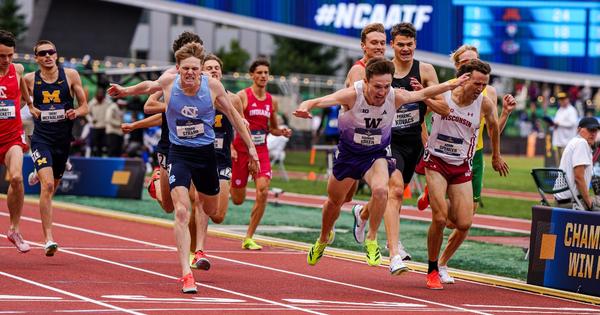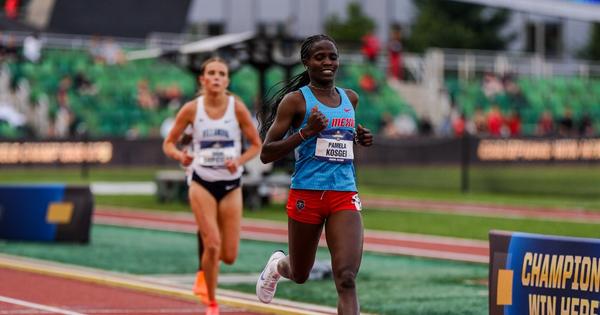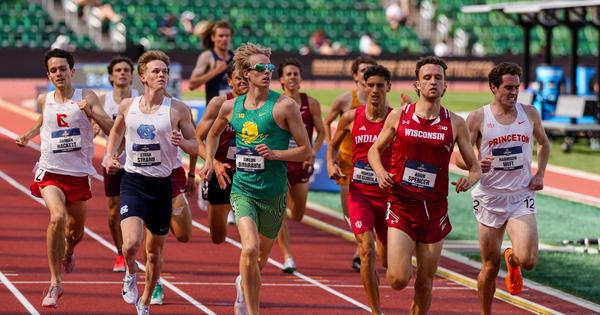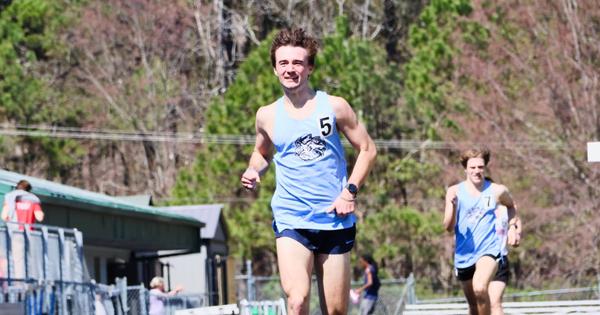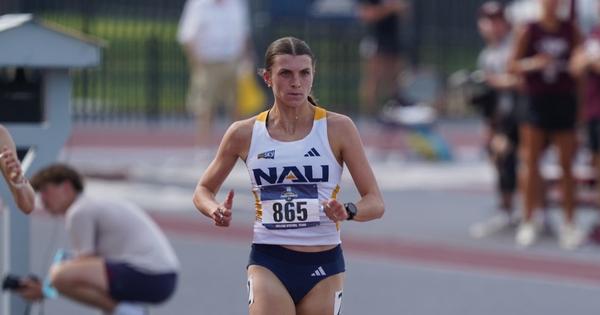By Keenan Baker
June 14, 2025
Day 3 of the NCAA Championships!
I walked into the stadium with chills, and I couldn’t tell if it was because I forgot to wear a jacket or if I was genuinely that excited for the day to start. I’m going to settle on it being a mixture of both—too many finals not to be excited, and too little sun not to be cold.
11:45am – Heptathlon 100m Hurdles
First event of the day, the 100m hurdles. All the major contenders were there, but Notre Dame’s Jadin O’Brien took the win in a time of 13.33, which gained her 1075 points. The first event sets the tone for the rest of the day, so seeing quite a few PBs and SBs down the line in the results is a good sign—it’s going to be a close competition.
12:45pm – Heptathlon High Jump
Pippi Lotta Enok of Oklahoma was on a roll through the first two events.
The second ranked qualifier in the heptathlon had herself two PBs through two events, and placed second in the high jump to Destiny Masters of Wichita State, who had a season’s best. Lotta Enok, the Estonian national record holder in the Pentathlon, is projected to win the title through the first four events, largely because of her personal bests through the first two rounds.
2:15pm – Men’s Discus Final
California’s Mykolas Alekna, the world record holder in the men’s discus, stepped into the ring for his final throw.
It wasn’t the competition anyone thought he would have, fouling off three of his five total attempts, and sitting in second place behind Oklahoma junior Ralford Mullings. Mullings, to his credit, didn’t make it easy for Alekna, throwing a meet record 67.70m in the third round (the previous meet record stood since 1992 at 67.06m).
It’s rarely silent for the throws, as they typically happen in tandem with the rest of the events going on around it. The crowd hushes when it comes time to start any race on the track, and they definitely won’t for jumpers, but the throws continue on their own.
Alekna’s final throw happened in near complete silence.
It gave everyone in the crowd the opportunity to hear the missile disguised as a discus clang off the foul pole, confirming Alekna’s place in second and Mullings in first.
Alekna threw over 75 meters this year. He was the far and away favorite. And, as this meet has shown, there’s been plenty of sixth round magic at Hayward Field. But today, all of that magic was reserved for Mullings, as he threw a season’s best 69.31m on his final attempt, once again crushing the meet record.
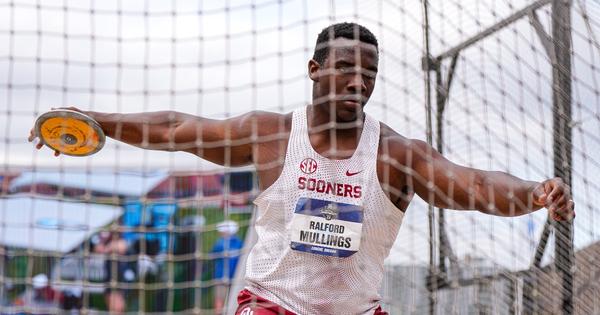
Photo by Audrey Allen / @audreyallen17
2:45pm – Heptathlon Shot Put
Not too many fireworks in the heptathlon shot put. O’Brien continued her winning ways, throwing a 14.44m final attempt to put her in the lead—in both the shot put and the event as a whole.
O’Brien, who won three consecutive indoor NCAA Pentathlon titles for the Fighting Irish, finished runner-up in this event last year. She’s currently projected to be the runner-up overall, but if the string of consistently solid marks has shown anything, it’s that O’Brien is a force to be reckoned with.
4:30pm – Men’s High Jump
Georgia’s Riyon Rankin, the number one high jumper in the nation, reached heights of 2.29m this season, or seven and a half feet. He jumped 2.10m. To put it bluntly, that was unexpected.
Ole Miss’s Arvesta Troupe, the number two high jumper in the nation, went a different path and was the only high jumper on the day to clear 2.23m—and he cleared it on his first try. He continued jumping and achieved a new personal best at the 2.27m mark. Why not?
I also have to recognize the strong contingent of Texas State high jumpers with Kason O’Riley and Aiden Hayes tying for second place. Iron sharpens iron, and the Texas State Bobcats hadn’t watched a jumper make it on the podium since 1990.
4:50pm – Men Collegiate Wheelchair 100m
This might be the only event where people who placed top ten at World Marathon Majors also win national titles in the sprints.
Illinois and Arizona have established themselves as powerhouses in the Wheelchair 100m, as all eight of the finalists came from one of those two schools. The reigning NCAA champion, Evan Correll of Illinois, took home the title again in 14.46, continuing to be the only person to ever win the NCAA title for the wheelchair 100m (the first-ever competition was held last year).
Correll also finished sixth at the Boston Marathon and 11th in the London Marathon—again, how insane is that? I know a good number of wheelchair athletes do compete in a much wider range of events, but I still did a double take when I heard that he finished sixth in the Boston marathon right before winning a sprint title.
I wonder what Rory Linkletter could sprint for a 100m.
5:02pm – Men’s 4x100m Final
I sat in a great spot for this race. Auburn coaches in front of me and to my left, Tennessee behind me and to my right, Texas directly to my left, and USC behind. In the end, only one of these teams would have something to cheer for—and it made the build-up to the start that much more tense. My head was on a swivel for the entire race, watching everyone’s reactions, which meant I didn’t even see the race until it showed up on the replay board. All I knew was that Auburn won.
First leg: good handoffs.
Second leg: good handoffs.
Third leg: okay handoffs.
For a second there, in the middle of the homestretch, I thought USC was going to walk down Auburn, but Makanakaishe Charamba hit another gear and flew through the finish line to anchor Auburn to a time of 38.33, beating USC, Arkansas, and the top team in the nation this year, South Florida. After tying the meet record in the semifinals, Auburn looked to be the favorite, and they held onto the top spot again today.
Two other interesting notes from this race:
- Dario Matau exchanged barbs with the Tennessee contingent sitting behind me. I wouldn’t so much say exchanged, as when he asked what “y’all are going to say now,” they said nothing in response. I love trash talk—especially when it's backed up.
- LSU got disqualified under rule 15.5-2b—stating they took “2+ steps on or Over lane.” That’s not the first time in this meet the rule has been applied well after the race (Edidiong Udo of OSU in 400m heats) and spoiler: it won’t be the last time either. In rewatching the finals, I couldn’t see any LSU runner step over the lane, but it’s possible it happened earlier on and I just couldn’t see it on the broadcast. Still…
5:10pm – Men’s Triple Jump Finals
Oklahoma’s Brandon Green Jr. controlled the Triple Jump more dominantly than anyone I had ever seen control a field/throws event this entire meet. Save for a foul in the fourth round, Green Jr would’ve won the championship off of any single jump. Oklahoma went 1-2 in this event, too, with Floyd Whitaker getting a personal best and finishing at 16.41m behind Green Jr’s 16.81m final round mark.
The competition itself was straightforward. What was even more interesting was how the jumpers interacted with the rest of the track.
The stage was set for the 400m hurdles to begin, all the hands were checked to ensure they were behind the line, Nathaniel Ezekiel did a massive spit-take, and everyone was set to go. Quiet on the track. I could hear the person breathing next to me.
CLAP CLAP CLAP CLAP CLAP ClapClapClapClaClaCLlapClapClpp WOOOOOO
Oskar Edlund of Texas Tech shot his hand up for a reset. The sprinters reset. Took a minute. Got ready to go again.
JUST KIDDING – CLAPCLAP CLAPCLAP CLAPCLAP CLAPCALPALCPAPALCPA
I’ve never seen so many people be so mad at triple-jumpers in my life. And I wouldn’t blame the triple jumpers, either, it’s simply that the timing didn’t work out. But I fully expected the 400m hurdles to never start their races—the timing perfectly misaligned.
The triple jumpers deserved their moment. I’m happy the 400m hurdles didn’t false start in the process, too.
5:12pm – Men’s 1500m Final
I’m going to come clean here. I’m not a fully impartial journalist when it comes to the 1500m races. I go to school at UNC Chapel Hill, and I wrote a feature about Ethan Strand and his meteoric rise to success.
I was fully cheering for Ethan Strand every step of the way. And, unlike a few people online, I’m not going to bash him for running a tactical race—it’s what is expected in these championships.
“If you’re the fastest in the field, why don’t you go out the fastest and run the fastest race?” AKA the Jakob Ingebrigtsen style of 1500m championship racing. That’s also the style of racing that got him fourth in the Olympic Games. The person who won, Cole Hocker (Oregon Alum), did not have the fastest PR in that race, but did in fact have the strongest kick. The tactics in a 1500m championship race are tantalizing, and often frustrating, but I have to assume people know their strengths and try to play to them. The fastest aren’t always the best, and the best don’t always win.
But I have to hand it to Nathan Green of Washington. Nathan Green’s talent in the mile is undeniable, and his final lap kick is lethal. He found the best positioning in the field, muscling his way to the front at the start of the last lap next to Wisconsin’s Adam Spencer, and had just enough of a kick to hold off Strand. Strand, to his credit, was dead last with 150m to go but found three extra gears to almost, just almost nip Green at the line. By my modest guess off of the broadcast footage, he looked to have run a sub-25 second final 200m.
Nathan Green deserved that win. Every other contender in what should be known as the strongest field of NCAA 1500m runners ever wasn’t a factor in that closing stretch, and Green’s final race as a Huskie cemented his legacy as one of the best NCAA 1500m runners of all time, and Washington as one of the best 1500m programs of all time. Green called Hayward Field “the Dog House” – and rightfully so.
Dub after Dub after Dub for UW. I should’ve known.
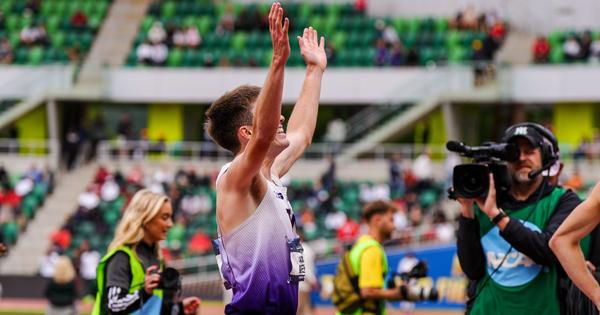
Photo by Audrey Allen / @audreyallen17
5:24pm – Men’s 3000m Steeple Final
What an incredibly fast steeplechase final. The top four runners in this race all deserve special recognition, but all for different reasons, so I’ll give them kudos in inverted order of their finish.
- Joash Ruto, the Iowa State freshman, made a point to keep the pace honest through the semifinals and the finals. It was his 64.17 third lap that strung the field out, and while Geoffrey Kirwa of Louisville did bridge the gap almost immediately, Ruto received a well-deserved PB to finish in 8:20.47, now ranked 30th in the world.
- Carson Williams of Furman, similarly to Ruto, put himself in a position to contend in each race of the steeplechase these championships. He came into this week ranked 12th in the nation, with a PB of 8:30.83, and leaves with a huge PB of 8:19.71 to finish third overall. He’s now ranked 27th in the world and fifth in the nation.
- Geoffrey Kirwa of Louisville gave himself the best chance he would have to beat James Corrigan over the steeple. The two men with the fastest personal bests in the field were 100% the favorites, but everyone was aware of Corrigan’s ability to kick. Kirwa took over the pace when Ruto fell back, and continued to turn the screws, going into the bell lap almost two seconds ahead of the BYU athlete. No personal best, but a hard-earned second place.
- James Corrigan of BYU is the national champ over the steeplechase distance. He finished the race with a lethal 61 second final kick, making up the almost-too-large gap between himself and Kirwa with 200m to go. Kirwa made a final push over the last barrier but it was too little, too late and Corrigan took home the win in 8:16.41. Not a personal best, but less than three seconds off in a championship race—easily his best win.
- He’s also expecting a kid with his wife! So many reasons to celebrate for Corrigan and BYU.
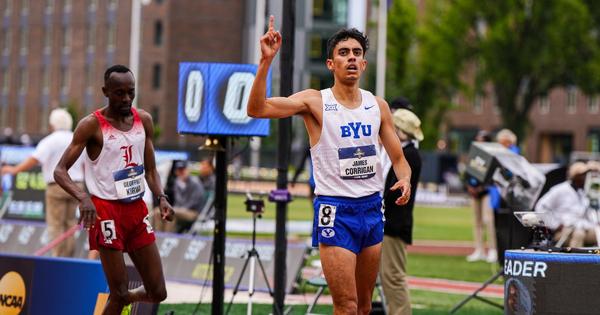
Photo by Audrey Allen / @audreyallen17
5:42pm – Men’s 110m Hurdles final
It was a battle between two hurdlers in this race: Auburn’s Ja’Kobe Tharp and Arizona’s Zachary Extine. Even until the final hurdle, Tharp turned on the jets and finished first in a time of 13.05.
13.05, which is a personal best.
13.05, which is the third fastest time in the world this year.
13.05, which makes him the fifth fastest 110m hurdler in NCAA history.
And he’s only a sophomore.
The indoor champion becomes the outdoor champion in a clean race with no wind.
Finished the race and immediately went to hug his mom.
I almost teared up watching them celebrate together. It was a beautiful moment and a beautiful run.
5:52pm – Men’s 100m Final
The 100m finals didn’t exactly break the American record, but I don’t know if I can say that was anybody in the field’s fault. The scuttlebutt was that the sprinters were told to warm-up a little too soon, and the weather definitely was less favorable than it was yesterday for the quickest times. Colder weather, improperly timed warm-up—not the fastest times in the world for some of the world’s fastest runners.
Israel Okon of Auburn looked the quickest through 50 meters, but as the race progressed, the field started to even out. The sprinters crossed the line in a blanket finish, and while the camera focused on Jelani Watkins, it really should’ve looked at lane 9.
Everyone in the crowd took a breath at the finish. Nobody really knew who won. Except Jordan Anthony.
Jordan Anthony of Arkansas, the fastest time qualifier (in all-conditions) coming into this meet, left the race as the fastest man in the nation. 10.01 seconds was the final time. Max Thomas of USC and Jelani Watkins of LSU ran an extremely close race, with Thomas grabbing second by one-thousandth of a second (10.091 to 10.092).
If you’re purely looking at the times, you might feel a little let down. But if you watch, and rewatch, and rewatch, and rewatch the 100m race like I’ll have, you’ll see just how interesting those 10 seconds were.
6:02pm – Men’s 400m Final
Samuel Ogazi of Alabama made up the stagger on Gabriel Moronta of USF on the backstretch, going out hard and was rewarded in the process. He was told by his coach to control the final, and control it he did. There was no part of this race where he wasn’t in the lead. His winning time was 44.84, three quarters of a second ahead of the next finisher, William Jones of USC.
After the race finished, it appeared that Moronta finished in second in a time of 45.47s. It’s a placement that would end up having massive implications for the team title had it actually counted—but for the same rule, 15.5-2b, he was disqualified. Not only disqualified, but disqualified well after the race was over.
Once again, I’m assuming I’m missing something from the broadcast footage and what I saw in person. I wasn’t close to the final turn, where the yellow flag was raised, but I’m still skeptical. It simply sucks to see someone run their heart out in a race, get second, and find out much, much later that their foot may have grazed the inside of the line.
6:14pm – Men’s 800m Final
Sam Whitmarsh, in his interview after winning the 800m final, made sure to say that “nothing (was) bigger than the team.” Pat Henry, who has long preached the importance of saving the sport of track and field through embracing the team element, must’ve loved that answer.
It was a hard-fought win for the Aggie, who ran 1:45.86 to hold off hard-charging Oregon Duck Matthew Erickson and Rivaldo Marshall of Arkansas. Whitmarsh, whose mustache and friendly demeanor has made him a fan-favorite in track and field, garnered a huge cheer as he crossed the line. He won for himself, his team, and for the sport of track and field.
Another special shout-out goes to Oregon’s Koitatoi Kidali. His hard fall at the tail end of his semifinal two days ago brought him into this race with a limp and a bandaged shoulder, but he still competed. Much ado has been made about his inability to hit the same times he hit last summer, running 1:42.66, but he’s clearly shown a desire to compete for the team. Should adjustment take more than a year, Kidali shows the drive to make that adjustment worth the wait.
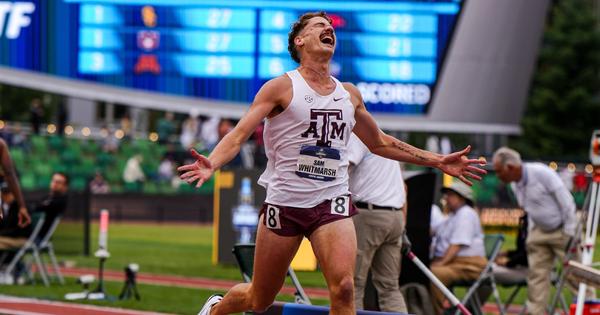
Photo by Audrey Allen / @audreyallen17
6:27pm – Men’s 400m hurdles Final
The start of the 400m hurdles final was more suspenseful than the race itself. Once the gun went off, it was always going to be Nathaniel Ezekiel of Baylor crossing the finish line first.
The time of 47.49 is currently second in the world over the 400m hurdles distance, second only to the world record holder, Karsten Warholm. Without the inopportune start, and better conditions, I could see Ezekiel going even quicker—making this summer’s World Championships even more intriguing. Could we see a new entrant into the 400m hurdles “Big 3” of Warholm, Rai Benjamin, and Alison Dos Santos?
I’d say so. I also am betting Ja’Qualon Scott continuing to improve on his 48.29s second place personal best. He was visibly and audibly frustrated after holding off Ezekiel until the last hurdle, when Ezekiel finally pulled away. If Scott continues his season at USA nationals, he could be a dark horse pick to make the team.
6:37pm – Men’s 200m Final
Well, I was wrong. Maybe it was the number of races on the other contender’s legs, or I just didn’t do a proper amount of research, but Carli Makarawu of Kentucky was not who I thought was going to win that 200m race.
I thought for sure Charamba of Auburn looked the strongest in the field coming out of the heats, and I thought for sure that T’Mars McCallum would be motivated to avenge his 4x100m and 100m defeats.
I was wrong. Makarawu ran a Kentucky record, a Zimbabwe national record, and a world number two time in his 19.84 victory. It was not the day for fast sprinting, but nobody told Makarawu that. It could’ve been because he listened to his parent’s advice and avoided the zombies chasing him, or it could simply be that he is the fastest 200m runner in the NCAA. I’m taking a mixture of both.
6:43pm – Heptathlon 200m
“That race sucks.”
– Destiny Masters to fellow competitors after finishing the 200m.
I have to agree, Destiny. The 200m race is not fun to run… at all. I think that’s just the distance runner in me. I still wonder, to this day, why I took up the offer to run in the 4x200m at my senior state meet. It was tragic.
But the 200m race for these heptathletes wasn’t tragic for everyone. Lotta Enok, once again, took home a personal best in a heptathlon event—one of only two athletes in the entire field that ran a personal best in this race. Her score in the final event of the day slots her at 3685, just 25 points behind O’Brien. The heptathlon is much, much closer than the decathlon was, and with only three events left, every single point counts.
6:55pm – Men’s 5000m Final
Everybody say thanks to Rocky Hansen and Matt Strangio!
The men’s 5000m came through the 1400m mark, averaging 70 seconds per 400m. It looked like it was about to be a repeat of Thursday night’s 10,000m, which would’ve let athletes like Strand of UNC and UNM’s Ishmael Kipkirui take a load off for a vast majority of the race, and potentially contend for a kick at the end.
But Rocky Hansen of Wake Forest took the lead and immediately ratcheted the pace down to 63 seconds per lap. As people started falling off the back, there still was a solid pack of 10 or 11 runners with four laps to go.
Matt Strangio of Portland held the lead until two laps to go, and looked strong in doing so.
“I knew this entire season, and today especially, that the best way I could honor him and everything he’s given me was to put my best foot forward,” said Strangio, talking about his father who passed away earlier this year. “I think I did that today.”
Strangio wound up crossing the line in sixth, but he still deserves celebration and recognition for the race he ran and the perseverance he showed in the process. There is no doubt that he certainly honored his dad in this race.
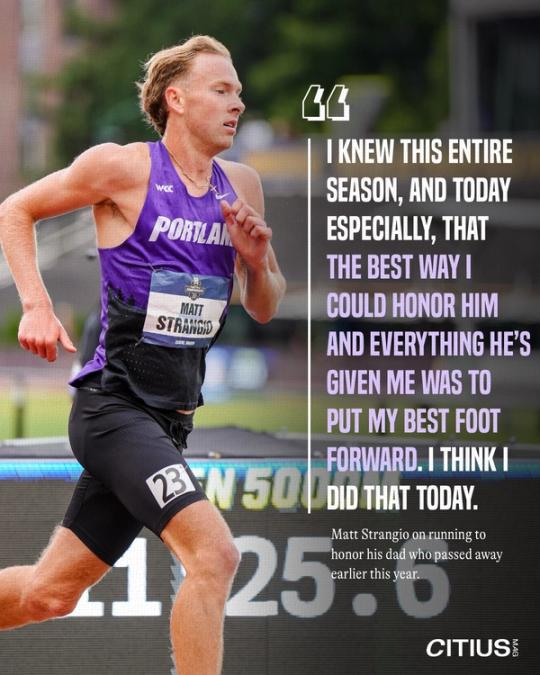
The winner, Brian Musau, took the lead and held it, holding off charges from Habtom Samuel of New Mexico and Marco Langon of Villanova. Langon, always the competitor, ran up to the outside of Musau’s shoulder with 100m to go, but just didn’t have any gas left in the tank and was passed by Samuel at the last second.
Musau won the first ever 5000m title for Oklahoma State on the outdoor track, and did so with a 59.9 penultimate lap, then a 55.77 final lap. It was a brutal race, one that felt like it got faster with each lap, and Musau prevailed as the victor.
After he finished his victory lap, he met his coach at the fence for a well-deserved post-race Jolly Rancher. If there’s anything I’m taking away from this race, it’s that I should start eating more Jolly Ranchers post-workout if I want to run a 13:20 5k with a 55 second close.
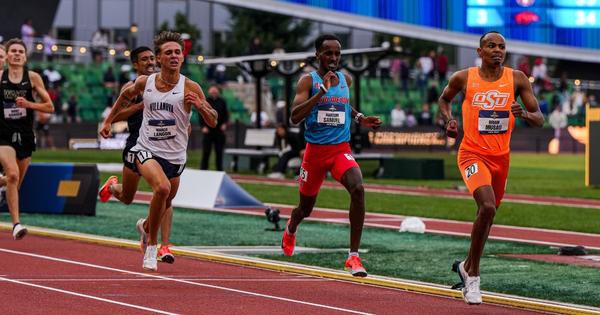
Photo by Audrey Allen / @audreyallen17
7:21pm – Men’s 4x400m Relay
The 4x400m relay is always the most exciting event in track and field, simply because of the stakes. Everybody was on the edge of their seats—if you’re the person that was sitting to my left, you were literally on the edge of your seat—and this year’s team battle had everything riding on the final race.
South Florida, the fastest team in the nation over the 4x400m, caused chaos in their win, outkicking Auhmad Robinson and Texas A&M on the final stretch. Gabriel Moronta ran a 44.23 anchor leg, recording the fastest split of the entire race, and was promptly clotheslined by his teammates at the finish.
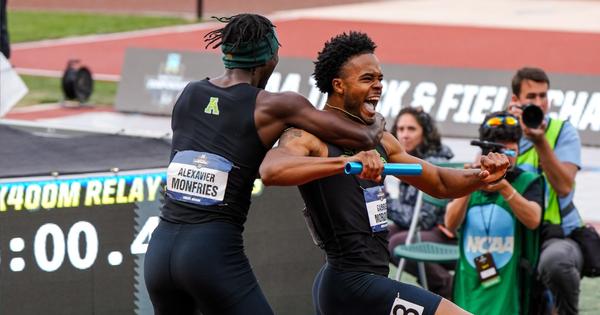
Photo by Audrey Allen / @audreyallen17
Texas A&M, by virtue of their second place finish, scored 41 points on the day. Because Robinson passed Arkansas on the final stretch, Arkansas fell one point down in the standings to finish with 40 points. And because William Jones of USC split a 44.53 final leg, USC ended up placing eighth, also grabbing 41 points.
It was a tie for the win. USC and Texas A&M were co-victors. Arkansas found themselves in third, one point behind the top spot.
It’s easy to look back at the rest of the meet and see places where points could be found. Yes, Moronta’s disqualification in the 400m had a huge part to play in the general standings—for both South Florida and everyone involved. But there were 21 events. It’s hard to point fingers at just one.
After the chaos of this year’s indoor final, and the state of the sport of the future, I can’t imagine a better finish than one of unity. The best teams … tied? It’s a bit pithy, but it’s a reminder that at the end of the day, track and field as a sport needs to work together to find progress forward. There are no winners if this sport is at a loss, and there are no true losers if there are people and stories to celebrate.
One more day of track and field to look forward to. My race of the day is either the 800m or the 100m. I’m honestly excited for each and every one.
___________________
Keep up with all things track and field by following us across Instagram, X, Bluesky, Threads, and YouTube. Catch the latest episodes of the CITIUS MAG Podcast on Spotify and Apple Podcasts. For more, subscribe to The Lap Count and CITIUS MAG Newsletter for the top running news delivered straight to your inbox.
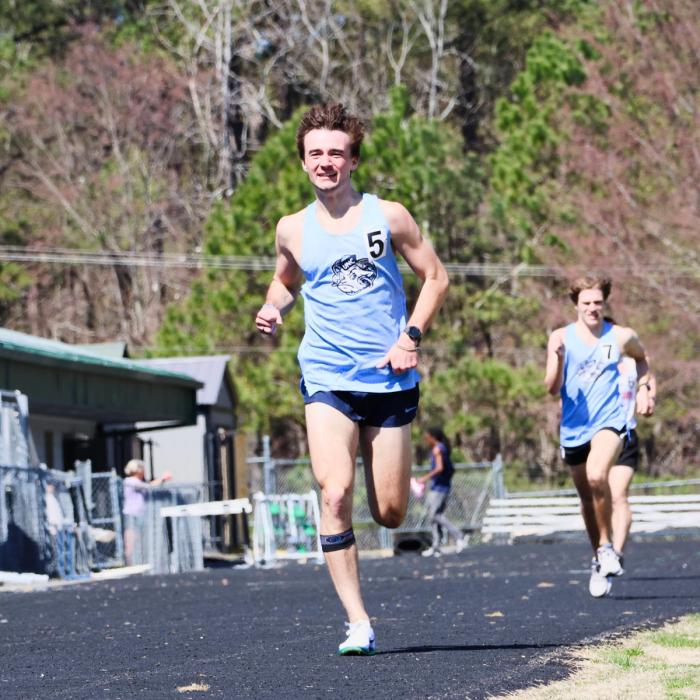
Keenan Baker
Keenan Baker is a track fan. He’s also a journalism major and writer at UNC-Chapel Hill. Putting both of those passions on the page together is the goal, and he looks forward to covering more track and field with CITIUS MAG this summer!
